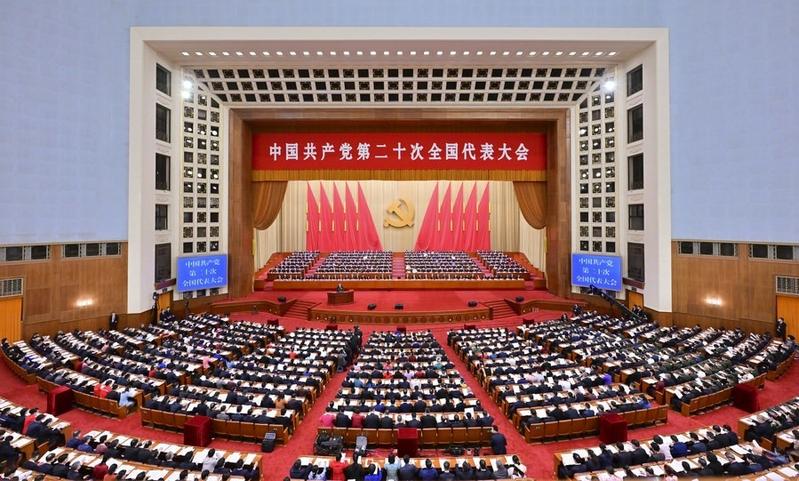 The 20th National Congress of the Communist Party of China opens at the Great Hall of the People in Beijing, China, Oct 16, 2022. (PHOTO / XINHUA)
The 20th National Congress of the Communist Party of China opens at the Great Hall of the People in Beijing, China, Oct 16, 2022. (PHOTO / XINHUA)
BEIJING – National security has been highlighted at the 20th National Congress of the Communist Party of China amid increasingly complex internal and external challenges the nation is facing on its new journey of building a modern socialist country in all respects.

In his report to the 20th CPC National Congress, Xi Jinping used a chapter to emphasize safeguarding national security and social stability, and called for modernizing China's national security system and capacity.
"National security is the bedrock of national rejuvenation, and social stability is a prerequisite for building a strong and prosperous China. We must resolutely pursue a holistic approach to national security and promote national security in all areas and stages of the work of the Party and the country, so as to ensure national security and social stability," Xi said in the report.
READ MORE: : Xi urges unity to achieve national rejuvenation
As the report outlines a road map for the next five years and beyond, analysts said that the CPC will give more attention to upholding national security and social stability in the foreseeable future in order to ensure its high-quality growth and modernization drive can be achieved as expected.
We will safeguard China's maritime rights and interests and resolutely defend our country's sovereignty, security and development interests ... we will crack down hard on infiltration, sabotage, subversion and separatist activities by hostile forces.
Xi Jinping, President, China
Analyzing Xi's report, Robert Lawrence Kuhn, chairman of the Kuhn Foundation and a renowned US expert on China, said that national security is more comprehensive in the report than he has heard it stated before, and encompasses every aspect of Chinese society.
Saying "security" and "safety" are stressed much more often in the report, Kuhn said China must be prepared to withstand major challenges.
In the report to the congress, Xi underlined the need to build "new security architecture" to safeguard China's new development paradigm.
While highlighting efforts to ensure the security of China's State power, systems and ideology, he called for building up security capacity in key areas, such as security regarding food, energy and resources as well as key industrial and supply chains, and improving the mechanisms for countering foreign sanctions, interference and long-arm jurisdiction.
"We will safeguard China's maritime rights and interests and resolutely defend our country's sovereignty, security and development interests ... we will crack down hard on infiltration, sabotage, subversion and separatist activities by hostile forces," Xi said.
Coordinating both development and security has become a part of Xi's governance philosophy in recent years. As China is facing mounting security risks and challenges due to the profound changes of the environment for its development, he proposed a holistic approach to national security in April 2014, when he presided over the first meeting of the National Security Commission of the CPC Central Committee.
The approach calls for ensuring both development and security and being ever ready to protect against potential dangers in times of peace.
For the first time, an integrated approach to development and security was listed in a special section in China's 14th Five-Year Plan (2021-25), and industrial and supply chain resilience was mentioned and prioritized in the plan for the first time.
Fu Xiaoqiang, vice-president of the China Institutes of Contemporary International Relations, said that modernization of the national security system and capacity is an important safeguard for steady progress of Chinese modernization — a central task the Party has laid out for realizing national rejuvenation.
Xi's highlighting of national security in the report to the Party's national congress from a strategic perspective of coordinating development and security demonstrates the crucial importance of such an issue in the overall work of the Party and the country, Fu told China News Service.
Experts said that China's security strategy is defensive in nature with an aim to safeguard its national sovereignty, security and development interests. It is different from the offensive US 2022 National Security Strategy, which was released on Oct 13, and claims that China "presents America's most consequential geopolitical challenge".
Azhar Azam, a market and business analyst who writes about geopolitical issues and regional conflicts, said that the US cannot secure itself by defining the era of international development and economic and technological cooperation as a contest between "democracy and autocracy".
ALSO READ: Greater successes for CPC expected
The US containment strategy against China under the pretext of national security, particularly in technology and economy, represents a foot in the door to implement a sweeping US global offensive plan, Azam said in an op-ed piece published on the China Global Television Network website.
"At a time when the world needs global cooperation on science, technology and innovation to achieve economic diversification and higher levels of productivity, a series of new aggressive restrictions on Chinese companies impedes international tech collaboration and threatens global industrial and supply chains," he said.
In terms of global security governance, Xi proposed the Global Security Initiative, which calls for upholding common, comprehensive, cooperative and sustainable security, and invites all countries to tackle global security issues through joint consultation based on equality rather than the exceptionalism of a particular country.
Adriel Kasonta, a London-based foreign affairs analyst and commentator, said the Chinese initiative has a huge potential to succeed because it is made "for the many, not the few".


